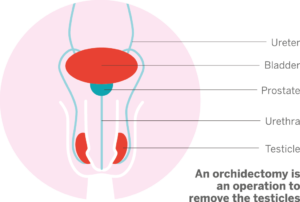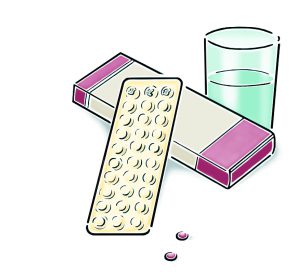When cancer spreads to other parts of the body (metastasises), it is called late or advanced prostate cancer.
On this page, we will explore:
- Chemotherapy
- Hormone therapy
- Orchidectomy
What are the options?
When cancer spreads to other parts of the body (metastasises), it is called late or advanced prostate cancer.
On this page, we will explore:
Chemotherapy involves using drugs that can kill or slow the growth of cancer cells by poisoning them. There are many different chemotherapy drugs and some of these have been found to be effective in treating prostate cancer. The most common chemotherapy drug used in the treatment of prostate cancer is docetaxel (Taxotere). Chemotherapy is usually given as injections into a vein. More than one drug may be given. You usually receive these drugs as an outpatient and you may need to go for treatment every few weeks for several months. The exact timing and length of treatment will depend on the drugs that your doctor feels will be most effective. Chemotherapy slows down the growth of both cancer and normal cells and can cause side effects.
There are new types of chemotherapy, hormone therapy and other drugs that are being investigated for advanced prostate cancer that are likely to be available in the future. There are also many trials of new drugs and you should speak to your oncologist to see if you would be suitable for one of these trials.
The side effects will depend on the drugs that you receive and will usually stop a few weeks after the course of treatment is completed.
Side effects can include feeling sick, but you will be given drugs that are very effective at dealing with this problem. Chemotherapy can sometimes cause damage to the cells in the bone marrow and this can temporarily cause fatigue and make you more prone to infections and bruising or bleeding. Other side effects include hair loss, loss of taste and neuropathy which may manifest itself as a feeling of ‘pins and needles’. Your doctor will explain the side effects for your particular chemotherapy regime.
To grow, prostate cancer needs the male hormone ‘testosterone’. When the cancer has spread beyond the prostate to nearby glands or bones (‘metastasised’), its growth can be delayed by stopping testosterone from reaching it. This is called ‘hormone therapy’.
There are three types of hormone therapy for advanced prostate cancer:
Orchidectomy is not a common treatment for prostate cancer. It involves removing the testicles by surgery. LHRH agonist injection treatment is as effective as an orchidectomy operation, and much more common.
Side effects of an orchidectomy
Because an orchidectomy cannot be reversed, you must consider the following permanent side effects before you give your permission.
You will:
It is possible to have prosthetic testicles implanted either during the operation or afterwards. These can be cosmetically and psychologically beneficial for some men, but some may experience problems with them long-term. It is important to ask about an implant and discuss it with your care team before making a decision.

Palliative therapy does not stop the growth of the cancer, but aims to reduce the pain and any other problems caused by it. It is very important that your GP and hospital team are aware of any other medication you are taking. This includes any herbal or ‘alternative’ remedies. If you wish to try any complementary therapies to help you cope with your symptoms, you should always talk to your own doctor first. They will advise you whether they are safe.
